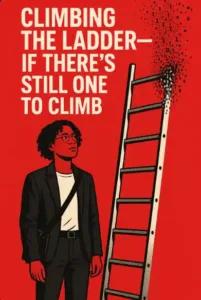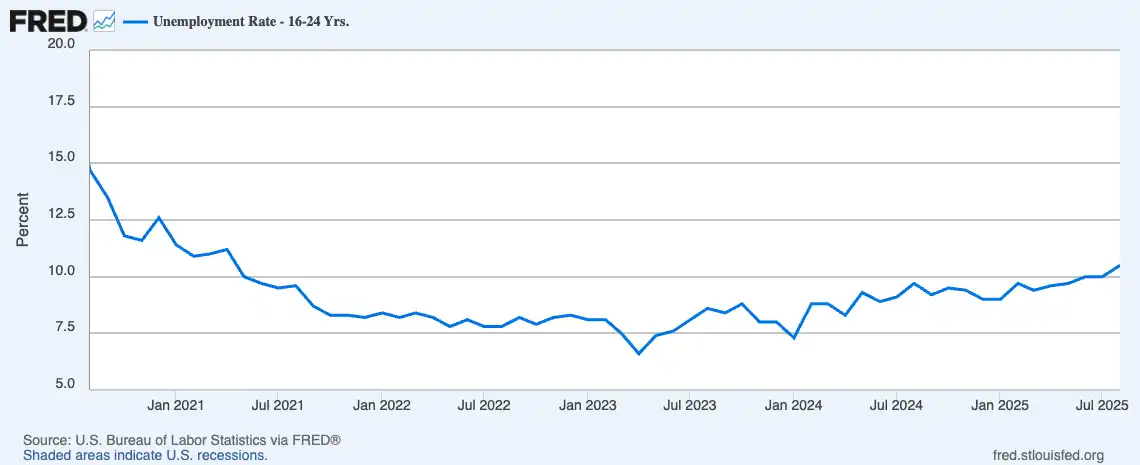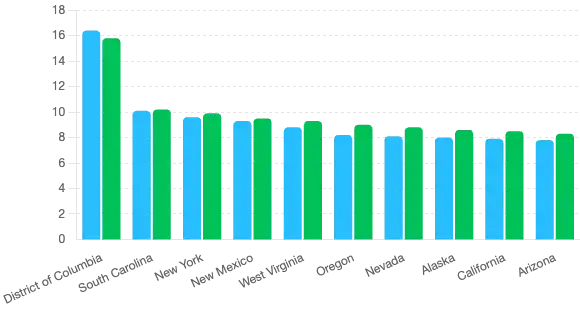Gen Z Unemployment: A Career Ladder Left to Climb?
 Happy Friday Job Board Doctor Friends!
Happy Friday Job Board Doctor Friends!
As the mom of three Gen Z young adults, my ears always perk up whenever I hear anything – data, anecdotes, horror stories – related to what is now their journey in the labor market.
Gen Z entered work during a global pandemic, a wave of remote-first offices, and now the rise of AI automation. In short, their “normal” has never been normal.
For us, thankfully, ours are all gainfully employed today. But if there’s one universal truth about parenting, it is that they will all inevitably hit rough patches in their lives, including job loss.
And selfishly, I want to do everything possible to keep from one reality – the one day they’ll be back on my couch, laptop open, muttering about the “job search.” (Love you, my babies <3)
So in this effort to bend future reality to my will, let’s dig into what’s really happening for Gen Z jobseekers and what it means for all of us who live and breathe hiring.
The Numbers: Not Terrible, But Not Great
Let’s start with a look at Gen Z unemployment data. According to FRED, the U.S. unemployment rate for workers aged 16–24 was about 10.5 % in August 2025, seasonally adjusted. In the U.K., youth unemployment sat at roughly 11.6 % in July 2025, and Germany came in around 6.3 % mid-year.
Those figures aren’t shocking—youth unemployment is always higher. What is notable is that, at least in the United States, Gen Z unemployment (starting with those old enough to work at 16) is rising.
In the 10 states (including Washington DC) with the highest Gen Z unemployment rate in 2024, we see a net negative change for each as of August 2025 with the exception of D.C. which improved slightly.
The Soft Skills Storyline
If you’ve spent five minutes on LinkedIn, you’ve seen it: “Gen Z can’t communicate,” “They don’t want to work,” “They quit by lunch on day two.”
According to a mix of research and anecdotal groaning, there’s at least a partial truth behind the noise. Studies from NCDA, Psychology Today, and ThriveTech all point to the same culprits.
- Digital upbringing: Gen Z grew up behind screens. Texting replaced hallway conversations; Discord replaced summer jobs. Great for memes, not so great for reading body language.
- The pandemic effect: COVID shut down internships, part-time gigs, and real-world exposure right when they were supposed to be learning how to handle conflict and feedback.
- Remote work continuation: Even post-pandemic, many early-career jobs stayed remote, cutting off the “overhear and learn” mentoring that happens in a real office.
The fallout? Managers feeling like they’ve become life coaches. Forbes reports that some leaders are openly hesitant to hire Gen Z because of the time needed to coach basic communication and teamwork. Others cite higher turnover tied to workplace misunderstandings.
Building the Bridge (Instead of Burning It)
There are actual solutions here. Companies that invest in structured onboarding and mentorship programs, real ones, not a one-hour Zoom with HR are seeing results. ThriveTech highlights organizations that pair younger workers with experienced mentors for six months, teaching not just “how to do the job,” but “how to work with people.”
Gen Z isn’t helpless either. Many are seeking out volunteer work, cross-functional projects, or side gigs precisely to sharpen communication and leadership muscles (The Muse).
Give them room, give them feedback, and maybe stop expecting 22-year-olds to behave like 45-year-old managers. The potential is there – it just needs shaping – just like we all did when we were, well, whatever age we are today.
The AI (or automation) Elephant in the Room
Now for the part that keeps me up at night: AI and/or automation is eating entry-level jobs.
CNBC reports that entry-level postings in the U.S. have dropped about 35 % since early 2023, with automation taking much of the blame. A Stanford study using ADP payroll data found that employment for 22–25-year-olds in AI-exposed roles like customer service and software development fell 13 % in three years.
Why? Because machines are now doing what interns used to do.
- Software development: AI writes and fixes code faster than a junior developer.
- Customer service: Chatbots don’t take sick days or ask for benefits.
- Operations and clerical: Routine data entry, reporting, and scheduling are quietly being absorbed by automation tools.
The Ripple Effects
Cutting entry-level jobs doesn’t just hurt individuals; it wrecks the pipeline. These were the roles where future leaders cut their teeth, where companies identified talent to develop. Remove that layer, and suddenly you have a hollow middle with no one ready to move up.
Fortune warns that eliminating starter jobs will leave employers struggling to build future expertise. And they are right. You can’t automate institutional memory or mentorship.
At the same time, Gen Z is adapting in ways that might make older generations blink. Some are jumping straight into freelancing or gig work. Others are skipping traditional employment altogether and starting micro-businesses online. It’s not necessarily a bad thing. It’s just a new thing. But it does raise questions about stability, benefits, and long-term career growth.
The Skills Shuffle
If AI is going to erase some entry-level roles, it’s also rewriting the skills playbook. Employers are already signaling they want candidates who understand how to use AI tools, not fear them. The Harvard Business Review and others have noted that AI literacy is becoming as fundamental as Excel once was.
That creates an uncomfortable tension: Gen Z is expected to arrive with both technical fluency and soft skills they haven’t had much chance to develop. Employers want digital natives with the interpersonal maturity of a ten-year veteran. In other words, they want unicorns.
What Happens Next
Gen Z’s story isn’t about failure – it’s about flux. Their early careers were shaped by a pandemic, transformed by AI, and scrutinized by every frustrated hiring manager on LinkedIn. But let’s remember, the same traits that frustrate older generations (questioning norms, demanding transparency, prioritizing mental health) are also the ones that might finally fix some of what’s broken about work.
Employers who figure out how to blend mentorship, training, and technology will win. Those who keep waiting for “perfectly polished” young candidates will lose the very people who can help them evolve.
So yes, they’ll need coaching. And yes, they’ll need patience. As a mama bear to three of them, who may no longer live under my roof still occupy the totality of my heart, I would rather bet on their adaptability than underestimate it.
Because if we’ve learned anything from every generation before them, it’s this: the they just do things differently.
Gen Z or an Economy in Trouble?
Does the growing unemployment rate for Gen Z signal trouble for the newest generation to enter the workforce or is this a symptom of an economy slipping into chaos?
Well, with the government still shut down we are all waiting on the official September jobs numbers. In the interim, there are certainly red light indicators flashing.
Some CEOs are starting to acknowledge that middle and lower income households are losing ground and they will need to adjust their business strategies based on this reality.
- On CNBC, McDonald’s CEO, Chris Kempczinksi “Particularly, with middle- and lower-income consumers, they’re feeling under a lot of pressure right now,” Kempczinski said. He added: “It’s really kind of a two-tier economy.”
- “There are certain cohorts of the consumer, definitely on the lower-income side, that are feeling pressure right now,” Chipotle CFO Adam Rymer told Reuters. “That’s something that we’ll have to take into consideration when looking at price going forward.”
In The Hill, Moody’s chief economist, Mark Zandi pointed to two separate private reports — from ADP and Revelio Labs — which, when averaged together, suggest there was “essentially no job growth” last month.
Finally, a word from my (second) favorite podcast duo: In this segment of Prof G Markets, Scott and Ed take a deep dive into the recession indicators and the growing divide between the rich and the rest of us. I can’t do the numbers justice – this is a must listen. I tagged the start and stop for you.
Until Next Time,
Julie “The Doc” Sowash
[Want to get Job Board Doctor posts via email? Subscribe here.]
[Got a tip, document or intel you want to share with the Doc? Tell me.



Comments (0)